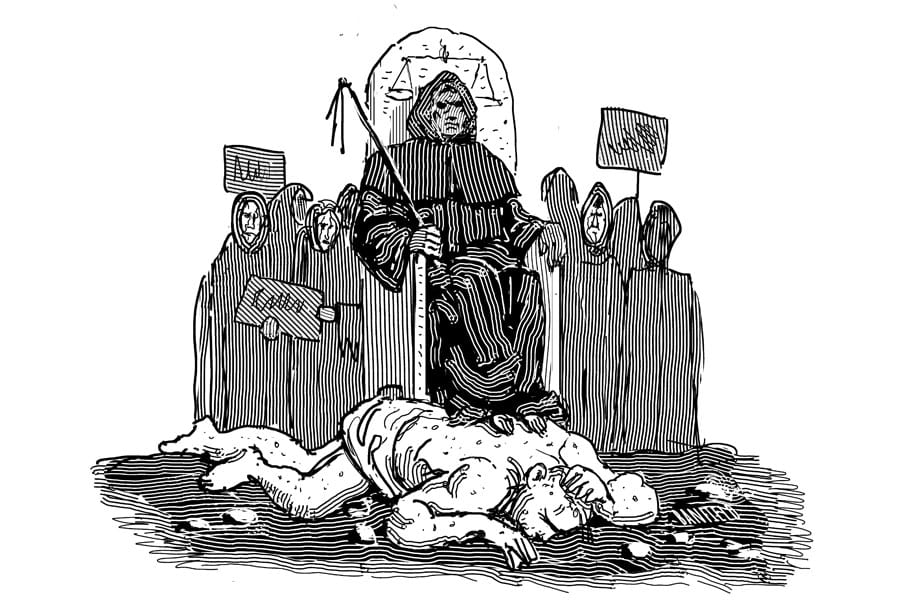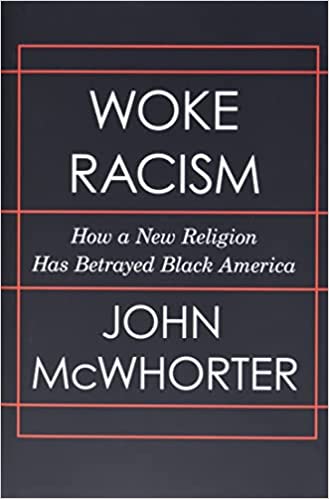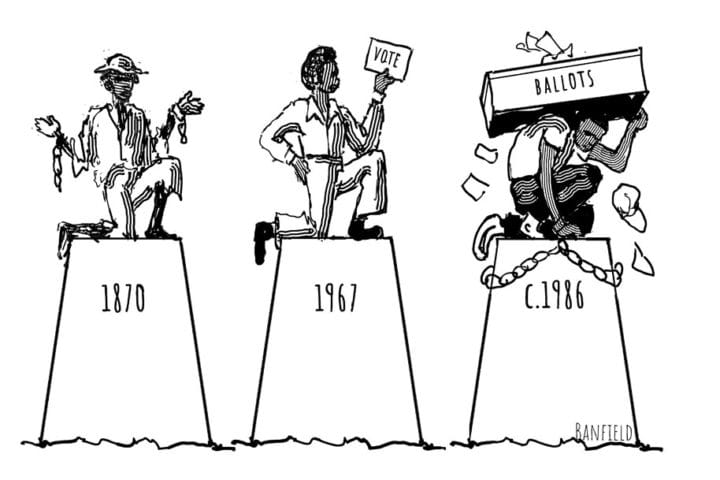Book Reviewed
John McWhorter, a linguistics professor at Columbia University, is no stranger to the topic of race. His latest book, Woke Racism, is valuable both for what it says and where it leads. The title, responding to the accusation that America is a racist country, counters that the wokesters are the racists. They believe that race determines one’s life in America and perhaps everywhere at every time, which is the mark of racism. “Racism” originally meant a doctrine (indicated by the -ism) but now extends to behavior, suggesting that behavior is determined by doctrine rather than by prejudice—as in “racial prejudice,” a phrase no longer heard. The woke have elevated the status of prejudice to the -ism of doctrine, while broadening doctrine to cover—indeed, to focus on—unintended slights and discourtesies.
The book’s subtitle, How a New Religion has Betrayed Black America, announces McWhorter’s thesis that woke is a religion. With its superstition, its clergy, its idea of original sin, its evangelical mission, its apocalyptical vision, its damning of heresy and punishment of heretics, and its desire to supplant all other religions, it is a religion at least in the sense of a church. What it lacks, one might offer in response, is God, a deity above humans, a normal feature of religion. It has the kind of piety that thinks “God is on my side,” though not the kind that regards God as a power above men to guide and restrain them. McWhorter takes the unstylish viewpoint of Enlightenment rationalism, distinguishing himself in his politely fresh way from the glowering multitudes of conservatives one might expect in his company. He reads the New Yorker and actually is a New Yorker. He does at one point call the woke a “sect”—a neutral term less offensive to believers than damning a bunch of atheists as a religion. It could have served in the subtitle.
* * *
McWhorter begins and proceeds with the assertion that the woke are unteachable—that is the reason why woke is a religion. Yet the Enlightenment, while attacking religion, never quite said that its votaries were unpersuadable by reason. McWhorter is less optimistic than Voltaire and even Machiavelli, who thought that they could win over the priests—religion’s most privileged. In fact, McWhorter does address the woke indirectly while claiming to speak only to middle-of-the-road whites and his fellow black citizens. To these two groups he points out contradictions in woke practice and emphasizes the harms done to the blacks, whom the woke movement is supposed to support.
These are matters that might also serve to wake up the woke, for let us not suppose that humans can totally forget their rational capacities. Self-interest may fall asleep and all of us run wild in our dreams. But there is always some sense even in our stubbornness and opacity that can be brought to light, confronted, and rebutted. One may not seem to have much effect on an overconfident foe, but one can always strike a blow and make a point. The object may seem unconcerned, but others may be watching and listening.
McWhorter gives examples when he identifies woke assurances he advises us to dismiss. One of them is never to blame the victim. This is part of the woke dream offered by what he calls “KenDiangelonian” religion—a jab of Enlightenment mockery, combining the two subtle philosophers and teachers of woke doctrine, Ibram X. Kendi and Robin DiAngelo. With this injunction the two wokester prophets assume that in practice black persons are unassailable. You might imagine you observe them doing wrong, but you are being misled by your racism.
* * *
Is this because blacks as a group are all-around excellent? The woke do not say that, nor do they say what could perfectly well be stated, the virtues shown by black citizens and the contributions they make to our country. One thinks of the many things in which black citizens excel and of the dull life of Canada to which we would be consigned without them. Above all, they know what it means and can say how one suffers from the oppressions of majority tyranny. They know the weaknesses and difficulties of democracy in a way that the majority, always believing in itself, does not. Black citizens make us think more deeply and carefully about our democracy and its reliance on political liberty.
The woke, however, do not want to claim any excellence for blacks because they do not want to get into an argument. They would rather say that blacks are innocent because that makes blacks unassailable, not open to criticism because any criticism proceeds from racism. Nobody not black is qualified to judge blacks. McWhorter disagrees. Children and fools are innocent; the assumption that blacks should never be blamed amounts to infantilizing them or treating them as idiots. McWhorter says that the woke insult and harm blacks in both ways by denying them the respect of being open to blame.
For to be open to blame is also to be open to praise, and even blaming is a sign of respect. A strange sign, to be sure, not one to be desired, but a truth endorsed by the most moral of all philosophers, Immanuel Kant. James Madison used this truth to undermine slavery in Federalist No. 54, where he conducts a dialogue between a Southern supporter and a Northern opponent of slavery. The proponent says that a slave is property because he’s not a moral person with the power to make choices. Yet the slavery regime has laws forbidding a slave to murder another slave, which presupposes that a slave is a moral person, capable of choosing. The woke for their part forget that people who cannot be blamed cannot be free. Thinking to eliminate white supremacy, they nourish it. They turn black citizens into recipients of favors they do not need if they are excellent and cannot use if they are perfect and innocent.
McWhorter says wisely that “humans seek pride where they can get it.” That single thought could serve as the theme of the race question in America, for slavery is an attack on human pride. The resentment of hurt pride has had a long life outlasting its original occasion, after first slavery and then legal segregation were abolished. That blacks continue to feel it and to demand the complete elimination of racial disparities, to exaggerate their inability to cope with their situation, and to blame white supremacy for denying opportunities that seem to be offered on a silver platter is the occasion for McWhorter’s comment. It’s their pride; it’s not that they are simply dupes of the woke. They would blame themselves if they didn’t refuse to be blamed by others.
* * *
The woke lead the demand today for the politics of identity, which they narrow to race. Race becomes the locus of pride, because it covers one’s self and one’s society—in effect everything. Identity is a matter of will, McWhorter notes; what you are is determined only by you and not by society. To McWhorter the linguist, one could suggest that “identify” has become an intransitive verb, with the power to assert: one says “I identify as…” not “I identify myself,” which requires oneself as the object being identified. It is passing strange, then, that your race, which is imposed totally without your consent, should be accepted as your identity by your will, regardless of any reason to justify your will. You can rebel against your sex today with eager support from the woke, but not against your race.
Does racial identity apply to all races, as in a theory of racism, or is it confined to the black race, endowing it with the only true pride of race? It seems that white supremacy is something to be ashamed of, not enjoyed. For whites, racial pride needs to be rejected in favor of racial guilt as shown in the slogan “Black Lives Matter.” One wonders at the confidence of the woke that in the face of their powerful onslaught, no longer only from the universities but now from the heights of capitalism, the outshouted multitude of whites, told by citizens with diplomas that they harbor guilty thoughts of supremacy, will not be goaded into their own racial pride of self-defense. One should be wary of identity and of unreasoned will, and particularly of the two together.
The alternative to white supremacy is meant to be not black supremacy but equality, the equality of “cultures,” meaning regimes and ways of life. This is the equality preached by “progressives,” now the party that believes least in progress. It is an equality of moral relativism, equating civilization with savagery. Savages at least don’t indulge in civilized savagery (though they might if they knew how). For this reason progressives must be mainly enlisted in combat against the votaries of civilization. Moral relativism must not only be accepted, it must be welcomed, and not only welcomed but enforced. Thus, we end with moral purity as the consequence of moral relativism.
Every departure from the morality of equality must be found and punished. The morality of equality is not, as it might seem, treating all as equals; it means treating all in a manner that transforms them into equals, which they are not at present. Progressives believe in equality as little as they believe in progress: the idea but not the fact. They see dimly that the engine of progress is a maker of inequality, but for all their doubts about civilization they are unwilling to abandon it for the sake of a savage equality that would mean life without comfort, peace, or universities. So they attack the former heroes of progress for their imperfect devotion to equality as understood (but not as practiced) today. As if they were alive, McWhorter says.
In regard to slavery everyone is an abolitionist now, so for the wokesters there is no excuse for not being one in the era when slavery was an issue. Here we come upon a troubling fact: slavery was not abolished by the abolitionists. It was abolished by Abraham Lincoln, who, to persuade others to the cause, did not hesitate to provide assurances of continuing racial inequalities not being challenged, and by troops of the Union army, who were fighting for the Union rather than directly against the evil of slavery. The inference is that we, secure today, have the right—no, the duty—to condemn the imperfect motives of those who led the fight and fought to the death. The woke today, for their part, have sacrificed nothing but their good sense. (By the by, note how the Union and the Constitution forming it have the happy faculty of combining diverse motives to a common goal.)
* * *
John McWhorter’s book has a similar diversity; it covers many of today’s issues for which there is no room here. One last point of his follows from the moral purity of moral relativism and its lack of proportion. Moral purity directed at every target now and in the past serves as a substitute for actually doing something to bring progress and to remedy the important disparities blacks suffer from. A nice phrase has been invented for it—virtue-signaling. It signifies a prideful claim to virtue shown mainly in the shaming of small lapses, wrong names, and old-fashioned pronouns. Deadly sins and important vices such as the human desire for mastery are more likely to be excused as dangerous to consider because they require thought and have no obvious remedy.
How accurate is woke virtue-signaling? The one American institution with the longest and closest association with slavery and segregation, from Andrew Jackson to Theodore Bilbo, is the Democratic Party. This is the party the woke have chosen.





